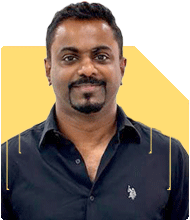Managing Expenses as a Retiree with a Low Pension: Advice for My Family.
Ramalingam Kalirajan |10899 Answers |Ask -Follow
Mutual Funds, Financial Planning Expert - Answered on Jul 24, 2024
He has an MBA in finance from the University of Madras and is a certified financial planner.
He is the director and chief financial planner at Holistic Investment, a Chennai-based firm that offers financial planning and wealth management advice.... more

Dear sir, My husband retaired from tyre factory He earned 1 Lack permonthly. We spend money for children education and we bought one house. Now my husband pension just 4000 and my salary 50k only. My two son are studying. How i will manage current economic situation. After retairement at the age what job he can do? Please give suggestion.
Let's assess your current financial situation and explore potential solutions to manage it better.
Income Sources:
Your husband's pension: Rs 4,000
Your salary: Rs 50,000
Major Expenses:
Children's education
Household expenses
Housing costs
It seems that your combined income is Rs 54,000 per month. However, managing with this amount, given your expenses, is challenging.
Immediate Financial Management Steps
Budgeting:
Create a detailed budget. Include all expenses: education, groceries, utilities, and housing.
Track spending and identify areas to cut costs.
Emergency Fund:
Maintain an emergency fund. It should cover at least 3-6 months of expenses.
If you don’t have one, start building it slowly by saving a small amount each month.
Debt Management:
Prioritize paying off high-interest debts first.
Avoid taking on new debt if possible.
Increasing Income
Part-Time Jobs:
Your husband can explore part-time or freelance work. Options include consulting, tutoring, or clerical work.
Websites like Freelancer, Upwork, or local classifieds can offer opportunities.
Skill Development:
Invest in courses or training programs to enhance skills.
This can open up new job opportunities with better pay.
Utilize Assets:
If you have assets like property or gold, consider renting out space or selling non-essential items.
Education Planning
Scholarships and Grants:
Look for scholarships and grants for your children’s education. Many organizations offer financial aid based on merit or need.
Research online or consult school advisors for available options.
Education Loans:
Consider taking education loans if necessary. Choose options with favorable interest rates and repayment terms.
Investment Strategy
Mutual Funds:
Invest in mutual funds through a Certified Financial Planner. They provide professional management and diversify risk.
Opt for regular funds rather than direct funds. Regular funds offer professional advice and support from a CFP.
Avoid Real Estate Investment:
Given your current financial situation, avoid investing in real estate. It requires significant capital and is not liquid.
Actively Managed Funds:
Prefer actively managed funds over index funds. Actively managed funds have the potential for higher returns as they are professionally managed to outperform the market.
Long-Term Planning
Retirement Planning:
Ensure you are saving for retirement. Invest in options like PPF or NPS.
Consult a Certified Financial Planner to create a retirement plan tailored to your needs.
Insurance:
Ensure you have adequate life and health insurance coverage.
It protects against unforeseen circumstances and reduces financial burden during emergencies.
Final Insights
Managing your current economic situation requires careful planning and disciplined financial management.
Focus on budgeting, increasing income, and making informed investment choices. Seek scholarships for education and invest in mutual funds with professional guidance.
Your husband can explore part-time job opportunities to supplement the household income.
Best Regards,
K. Ramalingam, MBA, CFP,
Chief Financial Planner,
www.holisticinvestment.in
You may like to see similar questions and answers below
Krishna Kumar | Answer |Ask -Follow
Workplace Expert - Answered on Jun 04, 2024
Ramalingam Kalirajan |10899 Answers |Ask -Follow
Mutual Funds, Financial Planning Expert - Answered on Sep 02, 2024
Ramalingam Kalirajan |10899 Answers |Ask -Follow
Mutual Funds, Financial Planning Expert - Answered on Jul 11, 2024
Rajesh Nair | Answer |Ask -Follow
Hiring, Leadership Expert - Answered on Aug 02, 2024
Krishna Kumar | Answer |Ask -Follow
Workplace Expert - Answered on Oct 03, 2024
Ramalingam Kalirajan |10899 Answers |Ask -Follow
Mutual Funds, Financial Planning Expert - Answered on Dec 17, 2025
Ramalingam Kalirajan |10899 Answers |Ask -Follow
Mutual Funds, Financial Planning Expert - Answered on Dec 17, 2025
Ramalingam Kalirajan |10899 Answers |Ask -Follow
Mutual Funds, Financial Planning Expert - Answered on Dec 17, 2025
Ramalingam Kalirajan |10899 Answers |Ask -Follow
Mutual Funds, Financial Planning Expert - Answered on Dec 17, 2025
Ramalingam Kalirajan |10899 Answers |Ask -Follow
Mutual Funds, Financial Planning Expert - Answered on Dec 17, 2025
Mayank Chandel |2576 Answers |Ask -Follow
IIT-JEE, NEET-UG, SAT, CLAT, CA, CS Exam Expert - Answered on Dec 17, 2025
Radheshyam Zanwar |6747 Answers |Ask -Follow
MHT-CET, IIT-JEE, NEET-UG Expert - Answered on Dec 16, 2025
Shalini Singh |181 Answers |Ask -Follow
Dating Coach - Answered on Dec 16, 2025
Patrick Dsouza |1429 Answers |Ask -Follow
CAT, XAT, CMAT, CET Expert - Answered on Dec 16, 2025
Nayagam P P |10858 Answers |Ask -Follow
Career Counsellor - Answered on Dec 16, 2025

























